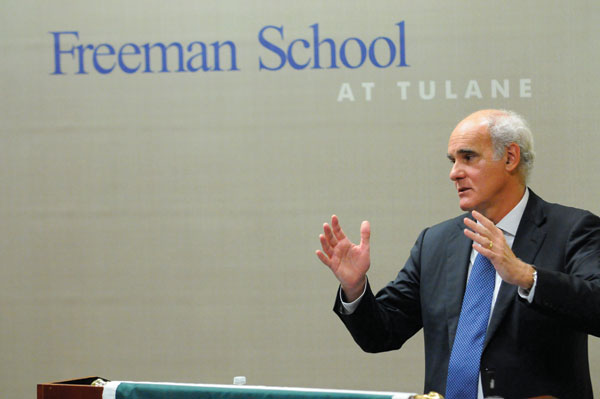
EU Ambassador to the U.S. João Vale de Almeida highlighted the importance of U.S.-EU trade in a talk at the Freeman School on Jan. 29.
When British Prime Minister David Cameron called for a referendum on Britain’s membership in the European Union, it was just the latest challenge to the beleaguered union, which has struggled in the wake of the global financial crisis. But in remarks at the A. B. Freeman School of Business in January, the EU’s ambassador to the United States said Cameron’s comments should not be interpreted as a rejection of the union.
“David Cameron in his speech is very clear about his own personal position—he believes that Britain should remain in the European Union,” said João Vale de Almeida, who has served as head of the delegation of the European Union to the United States since 2010. “We expect David Cameron to do what’s necessary to keep Britain in the European Union.”
Established in 1993, the 27-nation union is the world’s largest political and economic bloc. In his presentation to business students and faculty, Vale de Almeida discussed the past, present and future of the EU but put a special emphasis on the importance of the union’s relationship with the United States.
“If there’s one lesson that we need to draw from the financial crisis, it’s that we are in this together,” Vale de Almeida said. “The world economy is so globalized, interconnected and interdependent that what happens here in Louisiana matters for Europe just as what happens in Greece matters for Louisiana. That’s why it’s so important to look at the potential of cooperation between the EU and the U.S.”
Together, the U.S. and the EU represent 800 million consumers and account for 47 percent of the world’s gross domestic product, but Vale de Almeida said many U.S. businesses tend to overlook those facts when they think about international trade opportunities.
“We are so obsessed with China, and rightly so because it’s a great success story, but we sometimes forget that we are next door to a very powerful economic engine across the Atlantic,” he said. “Maybe this engine can go even faster and deliver more for us.”

